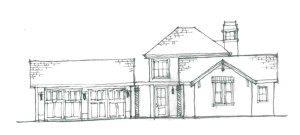Designing a house for myself is not always as dreamy as I thought
“Was I ever going to design a house for myself?” asked the student.
“Oh sure,” I said. “Someday.”
“What will it be like?” asked another.
I then gave an answer that I didn’t even know was waiting within me. Unstated notions residing deep inside came to the surface and a fully formed answer came out of me, as if I talked about this sort of thing all the time.
“My house will be eclectic,” I said. “Not of any one style. It will be so over the top and filled with ideas that it will all somehow work.”
I knew as I was saying it without time to filter my thoughts or edit myself that something significant had just happened, at least in my own little world . . .
* * *
AND NOW . . . TODAY:
It’s been five years since I was a guest speaker at my daughter’s art history class at the high school, showing images of my favorite buildings in the world. Since then a lot has happened. There’s been an economic bust and boom. Along the way Melody and I managed to buy a vacant lot for ourselves.
For many months I’ve been designing a house for me and my family to be built there from the ground up. Musing about its design is my Friday afternoon project — the thing I get to work on after taking care of business all week. Because it’s a vacant lot, it’s all on me to supply the form for this house. I’ve done that plenty of times before, but never for me. That makes a big difference. It’s what I’ve been waiting for, even before my sixth-grade math teacher, Mrs. Rhoades, caught me doodling a house in the margin of my notes and asked out loud in front of everyone if it was some sort of dream house.
To pay for the vacant lot, we had to sell off a couple rental houses, finally daring to touch the hallowed “nest egg.” Slightly scary, but it felt like it was finally time to make our big play.The surprising thing about this is that I’ve waited this long to write about it, considering I have an itch to write about all things concerning design and construction, especially thought-provoking things that stir me up — and believe me, this process has provoked thoughts and stirred me up.
I’ve struggled to come to terms with the tone I want this house to have. That’s been the toughest part, because every design decision meant opting for an idea that then ruled out all the other cool ideas that I could be doing in its place. I was certain that each path not taken would have surely been something exciting and worthy. But they were gone forever.
I have more than my share of books filled with glossy images of cool houses. Currently there are a couple stacks of them in my office, each shaggy with post-it notes protruding on all sides. These mark a hundred images, each deserving a sigh and a long moment of appreciation. The bulletin board over my drawing board is filled with pinned-up images.
Then there are the houses and their details that go by fleetingly in movies. If I’m watching alone I’ll go back, pause, and take a minute to do a quick sketch — after all, the best way to truly see something is to draw it. Then I’ll note the name of the movie at the bottom as well as how many minutes in, just in case I ever want to go back and take another look at that image.
I never do. Too many new images coming my way. The act of drawing it causes that building to be internalized in my subconscious knowledge bank, or so I hope. The sketches are saved, often rediscovered days or months later and admired anew.
A hundred years ago, the design of stylistically interesting cottages was very much in vogue. Architects like Bernard Maybeck and others could create houses that masterfully blended two styles into a cohesive whole. One such pairing was dubbed “Japo-Swiss,” which created an attractive variation of an arts-and-crafts look (despite the culturally tone-deaf label!). That blending intrigued me. Traditional ideas with a twist. Would it be possible to create a house that had the rambling aspect of a Mediterranean villa, but with Craftsman-style siding and details? A house with outdoor stairs and patios and arched windows but with shingle siding and tapered columns? Cool. People would have to pause when asked to identify the style of the house. I liked that.
My own design seems to be settling into a middle ground between many favorite styles I don’t even want to name. It is a mixed breed, just like the best dogs I’ve ever had.
I’m attracted to basic gable forms with steep roofs. I like a house that rambles and becomes whatever it needs to be, because of internal life forces or external views. There will be wood windows of all configurations and sizes set in thick walls of smooth stucco. Maybe some vertical siding as an accent. I’ll have awnings to shade the important windows that receive the south and west sun. These awnings will also provide an excuse for a strong color accent. I’d like a house with some of the exuberance of Mark Twain’s Hartford House. I want a courtyard away from the wind.
I hope it has something I call “balanced asymmetry,” like the kind that Julia Morgan could do so well, but with accent lights in front like Larry David’s Bel-Air house on “Curb Your Enthusiasm.” And with a cantilevered wood balcony like the house on page 191 of “Santa Barbara Style.” With brackets below, like at the Port San Luis Lighthouse. And it goes on from there.
The other night I saw that Rick Steves was on channel 9 ready to tour Croatia, and I couldn’t help but watch for a bit and dream of stone columns and colonnades and a different house that I will never get to build for myself. Ah, so many ideas, so little time.
Steve McKee is a Benicia architect specializing in residential design. He can be reached on the Web at www.smckee.com or at 707-746-6788.








Leave a Reply